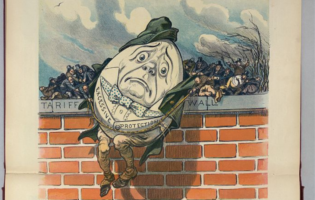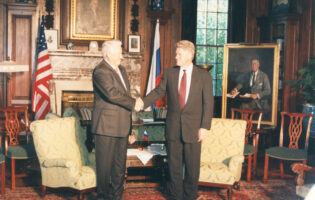Clashing Worlds and Images: Media and Politics in the United States and Germany

Karin L. Johnston
Dr. Karin L. Johnston is a political scientist specializing in international relations, comparative politics, foreign policy analysis, transatlantic relations, and German foreign and security policy. She teaches Comparative European Politics at the School of International Service, American University, in Washington, DC, and has taught courses in International Relations. She has worked in academe, nonprofit organizations, and policy research institutes in Washington, DC, including as Senior Research Associate in the Foreign Policy Program at the American Institute for Contemporary German Studies (AICGS).
Dr. Johnston has written policy analyses on a number of topics, including media and politics in Germany and the United States, United Nations reform, the role of religion in politics, German and U.S. public diplomacy, and U.S.-German-French relations. She has also published on public opinion and foreign policy, specifically, on German public opinion regarding the Bosnia crisis and the 2003 Iraq war. She is currently writing a book examining the German foreign policy decision-making process on out of area operations and the interaction and cooperation between military and civilian components in multilateral peace and stability operations.
Dr. Johnston received a PhD from the University of Maryland and an M.A. in International Studies from the Josef Korbel School of International Studies at the University of Denver in Denver, Colorado, where she also worked as an assistant in the Office of the Lieutenant Governor. Fluent in German, Dr. Johnston studied Politics and History at the University of Tübingen and was a Mercator Fellow at the NRW School of Governance, the University of Duisburg-Essen, in 2014.
She is a former fellow of the Robert Bosch Foundation Fellowship Program and past president of the Robert Bosch Foundation Alumni Association. She is a member of Women in International Security Studies (WIIS), the International Studies Association, the American Political Science Association, and the International Association for the Study of German Politics.
Issue Brief 1
Over the last two years the German-American relationship has been rocked by some of the most tumultuous and emotional conflicts in over five decades—the 2002 German elections and Schröder’s public rejection of American policies in Iraq; harsh recriminations surrounding the failed second UN resolution in early 2003; tensions over the Israeli-Palestinian conflict and future of the broader Middle East; and, above all, the war in Iraq and continuing postwar instability. These conflicts have been played out in intense public debates at home and across the Atlantic and amidst a political and moral tug of war in the media…









